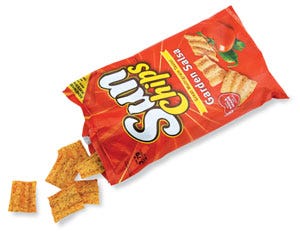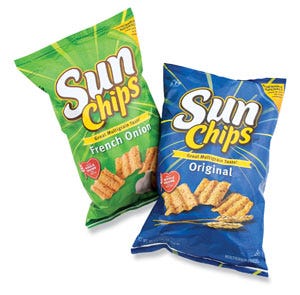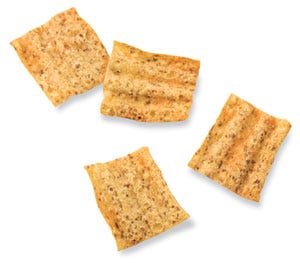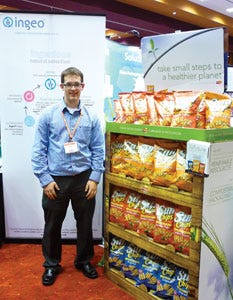January 30, 2014
|
Just in time for Earth Day, PepsiCo's Frito-Lay Div. is rolling out compostable packaging bit by bit this year, with a fully compostable bag due out on Earth Day in 2010. Applied to bags of its SunChips brand, a popular line of multigrain snacks, the plant-based, biodegradable material is a structure made of NatureWorks' (www.natureworksllc.com) polylactic acid (PLA) film, said to decompose over 14 weeks when placed in a hot, active compost bin or pile—at home or at an industrial composting site.
The PLA film is made with NatureWorks Ingeo™ biopolymer resin made from plant sugar.
Frito says it's the first in the convenience-food industry to introduce such packaging. Reports Thomas Oh, director of the SunChips brand, “Consumers very much want a healthier snack, and we realized a couple of years ago that those same consumers have an interest in what's healthy for the planet,” he says.
“From an organizational standpoint, SunChips is the lead brand for communications around sustainability initiatives.”
Frito-Lay also intends to eventually adopt bags for all of its chips that are made of the new material. “Right now, we are literally inventing the technology, and there is just not enough material in existence for the entire portfolio,” says Oh. “As we continue to develop and invest in the technology, the economies of scale will enable this to be spread across the rest [of Frito Lay's product line].” The brand's website, www.sunchips.com, is also posting a time-lapse video that shows the bag decomposing.
Taking the first step
|
Today’s launch of packaging made with renewable materials is an important first step... |
Currently, the SunChips brand is taking the first step toward transforming its packaging by revamping the existing 10.5-oz bag to include a renewable-material outer print layer of an extrusion-laminated, reverse-flexo-printed bag.
But for Earth Day 2010, Frito-Lay says that it plans to roll out a SunChips snack bag that incorporates all of layers made from PLA, so that the package will be 100-percent-compostable.
Environment is a top packaging priority
The company has been paying attention to consumer requests for such packaging. “We know environmentally-friendly packaging is a priority for our SunChips consumer,” notes Gannon Jones, vp of marketing at Frito-Lay North America. “Today's launch of packaging made with one-third renewable materials is an important first step to having a fully compostable chip bag in the market by Earth Day of 2010.”
|
Displayed by NatureWorks at Walmart's Packaging Sustainability Expo in April (see related story on p. 24), the current SunChips snack-food bag has three layers: the flexo-printed outer layer that now contains the matte PLA material, an inner metallized PP layer, which serves as a barrier to maintain the quality and integrity of the product; and a middle layer LDPE that joins the other two layers together. Currently, Bryce Corp. (www.brycecorp.com) converts all of the SunChips packaging material for Frito-Lay, including the PLA-containing SKUs, says Todd Fayne, a Frito-Lay engineer in advanced materials research. “The PLA film is manufactured out of Korea by SKC [www.skcfilms.com]. They are currently the only large-scale manufacturer of PLA film that suits our requirements,” Fayne says.
Graphics on the current bag's front panel feature a callout indicating, “Renewable materials make up 33 percent of this bag.
|
“Packaging is clearly the most visible interaction consumers have with Frito-Lay's brands,” adds Jay Gehring, vp, packaging R&D, at Frito-Lay North America. “To make packaging that would interact differently in the environment, we had to change the composition of the packaging and invent key technologies. Using plant-based, renewable materials, we have a promising solution that will transform packaging and significantly impact the billions of snack food bags produced annually.”
When the 100-percent-compostable bag launches, the company anticipates that the switch will lead to reduced greenhouse gas emissions in the production of the packaging and the elimination of petroleum-based packaging material.
The new bag campaign is being launched with help from several partners, including Hornall Anderson Design Works (www.hadw.com), which was involved in the packaging visuals.
Only the beginning
|
Frito-Lay materials research engineer Todd Fayne stands next to a SunChips display at Walmart's Sustainability Expo. |
Over the past few years, Frito-Lay's packaging initiatives have made some significant strides in reaching its sustainability goals. This includes reducing the amount of plastic in packaging by 10 percent over the last five years, and thereby eliminating 12 million lb of materials used annually to make the snack bags. What's more, Frito-Lay says it will be the first snack-food company to fund the collection and upcycling of its used packaging through a program in conjunction with TerraCycle (www.terracycle.net [see PD, Sept. '08, p. 42).
The launch of PLA packaging is yet another small step in the SunChips brand's sustainability journey.
On Earth Day of 2008, the SunChips brand celebrated a major milestone by inaugurating a solar concentrator field at Frito-Lay's Modesto, CA, facility where the power of the sun is harnessed to help in the production of SunChips snacks. The Modesto plant is one of seven Frito-Lay plants across the country that makes SunChips snacks. More details on Walmart's Sustainability Packaging Expo can be found in a related article in this issue and in podcasts on our website at www.packagingdigest.com.
More information is available: |
NatureWorks, LLC, 952/742-0580. www.natureworksllc.com. |
Bryce Corp., 800/238-7277. www.brycecorp.com. |
Hornall Anderson Design Works, 206/467-5800. www.hadw.com. |
SKC Films Inc., 678/342-1000. www.skcfilms.com. |
TerraCycle Inc., 609/393-4252. www.terracycle.net. |
About the Author(s)
You May Also Like







